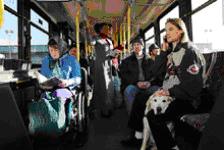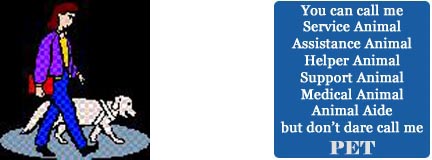DISABLED PERSONS
CIVIL RIGHTS
|
 |
|
Disabled
Persons Civil Rights
California Penal Code Section 365:
July 26, 1996
The
Civil Rights Division of the U.S. Department of Justice and the National
Association of Attorneys General have formed a Disability Rights
Task Force to promote and protect the rights of individuals with
disabilities.

We
have found that many businesses across the country have prohibited
individuals with disabilities who use service animals from entering
their premises, in many instances because of ignorance or confusion
about the animal's appropriate use. This document provides specific
information about the legal requirements regarding individuals with
disabilities who use service animals. It was prepared by the Task
Force to assist businesses in complying voluntarily with the Americans
with Disabilities Act and applicable state laws.
Twenty-four
state attorneys general* are distributing a similar document (including
state specific requirements) to associations representing restaurants,
hotels and motels, and retailers for dissemination to their members.
We
encourage you to share this document with businesses and people with
disabilities and their families in your community.
Deval
L. Patrick
Assistant Attorney General
Civil Rights Division
U.S. Department of Justice Scott Harshbarger
Attorney General State of Massachusetts
President, National Association of Attorneys General
*
Alaska, Arizona, California, Connecticut, Florida, Hawaii, Illinois,
Iowa, Kentucky, Maryland, Massachusetts, Michigan, Minnesota, Missouri,
Nevada, New York, North Carolina, North Dakota, Ohio, Pennsylvania,
Rhode Island, South Dakota, Washington, and Wisconsin.

Download
ADA_Discrimination_Complaint_Form
ADA_mediation_Title_II
COMMONLY ASKED
QUESTIONS ABOUT
SERVICE ANIMALS IN PLACES OF BUSINESS
Q:
What are the laws that apply to my business?
A: Under
the Americans with Disabilities Act (ADA), privately owned
businesses that serve the public, such as restaurants, hotels,
retail stores, taxicabs, theaters, concert halls, and sports
facilities, are prohibited from discriminating against individuals
with disabilities. The ADA requires these businesses to allow
people with disabilities to bring their service animals onto
business premises in whatever areas customers are generally
allowed.
Q:
What is a service animal?
A: The
ADA defines a service animal as any guide dog, signal dog,
or other animal individually trained to provide assistance
to an individual with a disability. If they meet this definition,
animals are considered service animals under the ADA regardless
of whether they have been licensed or certified by a state
or local government.
Service
animals perform some of the functions and tasks that the
individual with a disability cannot perform for him or herself. "Seeing
eye dogs" are one type of service animal, used by some
individuals who are blind. This is the type of service animal
with which most people are familiar. But there are service
animals that assist persons with other kinds of disabilities
in their day-to-day activities. Some examples include:
*
Alerting persons with hearing impairments to sounds.
* Pulling wheelchairs or carrying and picking up things for persons with mobility
impairments.
* Assisting persons with mobility impairments with balance.
Q:
How can I tell if an animal is really a service animal
and not just a pet?
|
|
 |
|
A: Some,
but not all, service animals wear special collars and harnesses. Some,
but not all, are licensed or certified and have identification papers.
If you are not certain that an animal is a service animal, you may
ask the person who has the animal if it is a service animal required
because of a disability. However, an individual who is going to a
restaurant or theater is not likely to be carrying documentation of
his or her medical condition or disability. Therefore, such documentation
generally may not be required as a condition for providing service
to an individual accompanied by a service animal. Although a number
of states have programs to certify service animals, you may not insist
on proof of state certification before permitting the service animal
to accompany the person with a disability.
|
|
 |
|
Q:
What must I do when an individual with a service animal comes
to my business?
A: The
service animal must be permitted to accompany the individual with
a disability to all areas of the facility where customers are normally
allowed to go. An individual with a service animal may not be segregated
from other customers.
|
|
Q:
I have always had a clearly posted "no pets" policy
at my establishment. Do I still have to allow service
animals in?
A: Yes.
A service animal is not a pet. The ADA requires you to modify your "no
pets" policy to allow the use of a service animal by a person
with a disability. This does not mean you must abandon your "no
pets" policy altogether but simply that you must make an exception
to your general rule for service animals.
Q:
My county health department has told me that only a seeing eye
or guide dog has to be admitted. If I follow those regulations,
am I violating the ADA?
A: Yes,
if you refuse to admit any other type of service animal on the basis
of local health department regulations or other state or local laws.
The ADA provides greater protection for individuals with disabilities
and so it takes priority over the local or state laws or regulations.
Q: Can I charge a maintenance or cleaning fee for customers
who bring service animals into my business?
A: No. Neither a deposit nor a surcharge may be
imposed on an individual with a disability as a condition to allowing
a service animal to accompany the individual with a disability, even
if deposits are routinely required for pets. However, a public accommodation
may charge its customers with disabilities if a service animal causes
damage so long as it is the regular practice of the entity to charge
non-disabled customers for the same types of damages. For example,
a hotel can charge a guest with a disability for the cost of repairing
or cleaning furniture damaged by a service animal if it is the hotel's
policy to charge when non-disabled guests cause such damage.
|
|
|
|
|
Q:
I operate a private taxicab and I don't want animals
in my taxi; they smell, shed hair and sometimes have "accidents." Am
I violating the ADA if I refuse to pick up someone with
a service animal?
A: Yes. Taxicab
companies may not refuse to provide services to individuals with
disabilities. Private taxicab companies are also prohibited from
charging higher fares or fees for transporting individuals with
disabilities and their service animals than they charge to other
persons for the same or equivalent service.
Q: Am I responsible for the animal while the person
with a disability is in my business?
A: No. The care
or supervision of a service animal is solely the responsibility
of his or her owner. You are not required to provide care or food
or a special location for the animal.
Q: What
if a service animal barks or growls at other people, or otherwise
acts out of control?
A: You may exclude
any animal, including a service animal, from your facility when
that animal's behavior poses a direct threat to the health or safety
of others. For example, any service animal that displays vicious
behavior towards other guests or customers may be excluded. You
may not make assumptions, however, about how a particular animal
is likely to behave based on your past experience with other animals.
Each situation must be considered individually.
Although a public accommodation may exclude any service animal that is out
of control, it should give the individual with a disability who uses the service
animal the option of continuing to enjoy its goods and services without having
the service animal on the premises.
Q: Can
I exclude an animal that doesn't really seem dangerous but is
disruptive to my business?
A: There may be
a few circumstances when a public accommodation is not required
to accommodate a service animal--that is, when doing so would result
in a fundamental alteration to the nature of the business. Generally,
this is not likely to occur in restaurants, hotels, retail stores,
theaters, concert halls, and sports facilities. But when it does,
for example, when a dog barks during a movie, the animal can be
excluded.
If you have further
questions about service animals or other requirements of the ADA,
you may call the U.S. Department of Justice's toll-free ADA Information
Line at 800-514-0301 (voice) or 800-514-0383 (TDD).
|
|
DUPLICATION
OF THIS DOCUMENT IS ENCOURAGED.
California Penal Code Section 365:
Right of Disabled Person to Have
Service Animal in Public Places
365. Every
person, and every agent or officer of any corporation carrying
on business as an innkeeper, or as a common carrier of passengers,
who refuses, without just cause or excuse, to receive and entertain
any guest, or to receive and carry any passenger, is guilty of
a misdemeanor. However, an innkeeper who has proceeded as authorized
by Section 1865 of the Civil Code shall be rebuttably presumed
to have acted with just cause or excuse for purposes of this
section.
365.5.
(a) Any blind person, deaf person, or disabled person,
who is a passenger on any common carrier, airplane, motor vehicle,
railway train, motorbus, streetcar, boat, or any other public
conveyance or mode of transportation operating within this state,
shall be entitled to have with him or her a specially trained
guide dog, signal dog, or service dog.
(b) No
blind person, deaf person, or disabled person and his or her specially
trained guide dog, signal dog, or service dog shall be denied admittance
to accommodations, advantages, facilities, medical facilities, including
hospitals, clinics, and physicians' offices, telephone facilities,
adoption agencies, private schools, hotels, lodging places, places
of public accommodation, amusement, or resort, and other places
to which the general public is invited within this state because
of that guide dog, signal dog, or service dog.
(c) Any
person, firm, association, or corporation, or the agent of any person,
firm, association, or corporation, who prevents a disabled person
from exercising, or interferes with a disabled person in the exercise
of, the rights specified in this section is guilty of a misdemeanor,
punishable by a fine not exceeding two thousand five hundred dollars
($2,500).
(d) As
used in this section, "guide dog" means any guide dog
or Seeing Eye dog that was trained by a person licensed under Chapter
9.5 (commencing with Section 7200) of Division 3 of the Business
and Professions Code or that meets the definitional criteria under
federal regulations adopted to implement Title III of the Americans
with Disabilities Act of 1990 (Public Law 101-336).
(e) As
used in this section, "signal dog" means any dog trained
to alert a deaf person, or a person whose hearing is impaired, to
intruders or sounds.
(f) As
used in this section, "service dog" means any dog individually
trained to do work or perform tasks for the benefit of an individual
with a disability, including, but not limited to, minimal protection
work, rescue work, pulling a wheelchair, or fetching dropped items.
(g)
(1) Nothing in this section is intended to affect any
civil remedies available for a violation of this section.
(2) This
section is intended to provide equal accessibility for all owners
or trainers of animals that are trained as guide dogs, signal dogs,
or service dogs in a manner that is no less than that provided by
the Americans with Disabilities Act of 1990 (Public Law 101-336)
and the Air Carrier Access Act of 1986 (Public Law 99-435).
(h) The
exercise of rights specified in subdivisions (a) and (b) by any
person may not be conditioned upon payment of any extra charge,
provided that the person shall be liable for any provable damage
done to the premises or facilities by his or her dog.
(i) Any
trainer or individual with a disability may take dogs in any of
the places specified in subdivisions (a) and (b) for the purpose
of training the dogs as guide dogs, signal dogs, or service dogs.
The person shall ensure that the dog is on a leash and tagged as
a guide dog, signal dog, or service dog by an identification tag
issued by the county clerk or animal control department as authorized
by Chapter 3.5 (commencing with Section 30850) of Division 14 of
the Food and Agricultural Code. In addition, the person shall be
liable for any provable damage done to the premises or facilities
by his or her dog.
365.6.
(a) Any person who, with no legal justification, intentionally
interferes with the use of a guide dog by harassing or obstructing
the guide dog user or his or her guide dog, is guilty of a misdemeanor,
punishable by imprisonment in the county jail not exceeding six
months, or by a fine of not less than one thousand five hundred
dollars ($1,500) nor more than two thousand five hundred dollars
($2,500), or both.
(b) As
used in this section, "guide dog" means any guide dog
or seeing-eye dog which was trained by a person licensed under Chapter
9.5 (commencing with Section 7200) of Division 3 of the Business
and Professions Code or as defined in the regulations implementing
Title III of the Americans with Disabilities Act of 1990 (Public
Law 101-336), or trained by a school recognized in another state
to train guide or seeing-eye dogs.
(c) Nothing
in this section is intended to affect any civil remedies available
for a violation of this section.
365.7.
(a) Any person who knowingly and fraudulently represents
himself or herself, through verbal or written notice, to be the
owner or trainer of any canine licensed as, to be qualified as,
or identified as, a guide, signal, or service dog, as defined
in subdivisions (d), (e), and (f) of Section 365.5 and paragraph
(6) of subdivision (b) of Section 54.1 of the Civil Code, shall
be guilty of a misdemeanor punishable by imprisonment in the county
jail not exceeding six months, by a fine not exceeding one thousand
dollars ($1,000), or by both that fine and imprisonment.
(b) As
used in this section, "owner" means any person who owns
a guide, signal, or service dog, or who is authorized by the owner
to use the guide, signal, or service dog.
|
|
|
|
|
|


